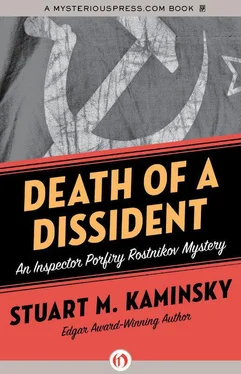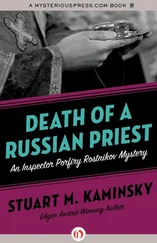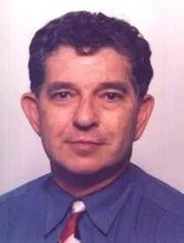Stuart Kaminsky - Death of a Dissident
Здесь есть возможность читать онлайн «Stuart Kaminsky - Death of a Dissident» весь текст электронной книги совершенно бесплатно (целиком полную версию без сокращений). В некоторых случаях можно слушать аудио, скачать через торрент в формате fb2 и присутствует краткое содержание. Год выпуска: 2012, ISBN: 2012, Жанр: Полицейский детектив, на английском языке. Описание произведения, (предисловие) а так же отзывы посетителей доступны на портале библиотеки ЛибКат.
- Название:Death of a Dissident
- Автор:
- Жанр:
- Год:2012
- ISBN:9781453266298
- Рейтинг книги:4 / 5. Голосов: 1
-
Избранное:Добавить в избранное
- Отзывы:
-
Ваша оценка:
- 80
- 1
- 2
- 3
- 4
- 5
Death of a Dissident: краткое содержание, описание и аннотация
Предлагаем к чтению аннотацию, описание, краткое содержание или предисловие (зависит от того, что написал сам автор книги «Death of a Dissident»). Если вы не нашли необходимую информацию о книге — напишите в комментариях, мы постараемся отыскать её.
Death of a Dissident — читать онлайн бесплатно полную книгу (весь текст) целиком
Ниже представлен текст книги, разбитый по страницам. Система сохранения места последней прочитанной страницы, позволяет с удобством читать онлайн бесплатно книгу «Death of a Dissident», без необходимости каждый раз заново искать на чём Вы остановились. Поставьте закладку, и сможете в любой момент перейти на страницу, на которой закончили чтение.
Интервал:
Закладка:
“Not in the least,” said Rostnikov sipping his own coffee.
“I have a new life, a new wife, a small daughter. Ilya is not part of that life. He spent seven years making my existence miserable, causing me trouble. He lived here and went to school. He was terrible in school. He got into trouble. Drinking, girls, gambling. He more than embarrassed me. He very nearly ruined me, and you know what? I think that is what he wanted to do. I finally threw him out. That is when he became a political dissident. I am the last person he would come to for help and the last person who would help him. You understand?”
“We want him because we have good reason to believe he murdered someone,” said Rostnikov softly.
Sergei Malenko’s face went white.
“No. That could ruin me,” he said almost to himself.
“It won’t do him much good either,” added Rostnikov.
Malenko looked up sharply.
“You either fancy yourself a wit or are foolish,” Malenko said between his teeth. “In either case, I suggest you tread softly, Inspector. Whom is he supposed to have murdered?”
“So far,” sighed Rostnikov, “his wife, Aleksander Granovsky, and a cab driver.”
The information struck Malenko like the blow of a tire iron. He sank back heavily and looked suddenly much older than his years.
“Is it possible,” he said so softly that Rostnikov could barely hear him, “that he would go so far to ruin me?”
“It is possible,” said Rostnikov, finishing his coffee. “It is also possible that his actions have little or nothing to do with you.”
“Then why did he do this?” demanded Malenko, his hair falling over his brow as he reached forward to pound on the table.
“I thought you might have some idea,” Rostnikov tried, “but I gather you have not, or the only one you have is of no great use to us. Did you know your son’s wife?”
“I met her once,” whispered Malenko, “on the street with him. She was a pretty girl who wanted to be friendly, but Ilya made a sarcastic comment and led her away.”
“Comment?” tried Rostnikov shifting his leg weight.
“Personal, political,” said Malenko. “Not relevant.”
“Perhaps-”
“Not relevant,” insisted Malenko, and Rostnikov nodded his agreement, though he could guess the content of the brief meeting between father and son on the street.
“You have no idea of where he could be, who he could go to?”
“None,” said Malenko. “We were never close. He no longer has the friends he had when he lived here. And before here we lived on a small farm beyond Kurkino. It has had two owners since.”
“I see,” said Rostnikov, rising slowly. “Then I believe that is all. Your first wife, Ilya’s mother. She died?”
“No,” said Malenko. His mind was elsewhere, planning his protection from his son’s reputation, but he answered, “We were divorced three years ago.”
“I see,” said Rostnikov. “And where can I find her?”
“It will do you no good to find her,” said Malenko, brushing his hair back with a broad brown hand. “She is in the Vilna Rehabilitation Institute.”
“Perhaps I can see her there,” said Rostnikov.
“You can see her if you insist,” said Malenko, guiding the policeman to the hall and toward the door, “but she will provide you no information. She is quite mad. She hears and sees no one but whoever might exist within her head.”
“I’m sorry,” said Rostnikov.
“There is reason to be,” Malenko said, opening the front door. Over his shoulder Rostnikov could see the second Mrs. Malenko looking apprehensively at them from what must have been the kitchen door. “Your records will show that she attained this ultimate escape after she murdered our infant son, Ilyusha’s brother, for no reason that anyone ever discovered.”
“I–I’m sorry,” Rostnikov repeated.
Malenko closed the door, and Rostnikov found himself facing his car and driver. He considered turning around and making another assault on Malenko. There was much to be said, much he might learn if he could get him to talk about his son, but it was likely he could not be goaded into such talk. Malenko was a shrewd man and one who very likely contributed to making those close to him go mad. But Rostnikov would not, could not accept the simple explanation for murder that one was mad, even madness had its own logic. Ilyusha Malenko had apparently murdered three people, and he had a reason for doing so. The reason might make little sense, but it was a reason, and if Rostnikov could figure out what that reason was, he might be able to anticipate the young man’s next move.
“Sir,” said the driver as Rostnikov got back into the rear of the car and closed the door.
“Back to Petrovka. Wait. No, the hospital. I want to stop by and see one of the inspectors.”
“Sergeant Karpo,” supplied the driver, pulling away from the house.
“You are well-informed,” said Rostnikov.
Sasha Tkach had been sitting in Inspector Rostnikov’s office with a pad of lined paper in front of him and several sharpened pencils. He did not sit behind the desk because he did not know how Rostnikov would take it if he found a junior officer there. Sasha Tkach felt more comfortable working with Rostnikov than with any other senior investigator, but it was wise to be cautious and not overly familiar. There was too much to lose. So while he waited for reports on the telephone taps and hoped that Malenko would be spotted by a uniformed officer or that he would make some mistake, Tkach sat on the wrong side of the desk unable to put his feet under it, made notes, and tried to complete his report on the discovery of the body of Malenko’s wife. That is what he did with the front of his consciousness. Deeper, but not much deeper, he wondered. One murder with a sickle, another with a hammer. Was the madman mocking the symbols of the Soviet Union? He was a dissident or a potential one. Was this some elaborate, ghastly joke? Then what about the cab driver? A broken vodka bottle didn’t fit. It was too much to worry about.
Tkach had spent five hours at the desk, unwilling even to leave for a drink to have with his sandwich, afraid to tie up the phone with a call to check on Karpo’s condition. It was shortly after two when the call came. It was Maxim, the expert who was monitoring all of the phone taps through a central unit he manned alone.
“I think we have something,” Maxim said with great excitement. “A call a few minutes ago to one of the people being monitored. A young man’s voice said only, ‘Meet me at four at the spot where I broke the window.’ ”
“That was all?” asked Tkach.
“That was all.”
“Can you play that part of the tape to me over the phone?”
“Yes,” said Maxim. “Give me just a few seconds.”
And, in fact, in no more than thirty seconds, Tkach heard a hum and a voice repeating the words, “Meet me at four at the spot where I broke the window.” Even with the distortion of the telephone line, Sasha recognized the voice of Ilyusha Malenko. He had not been sure that he would be able to do so, but as soon as he heard the first words he saw before him the young man and before the short sentence had ended, Sasha was again seeing the dangling body of the young woman.
“That’s him,” said Tkach. “Who was the call to?”
“Lvov, Simon Lvov.”
Tkach hung up and considered his alternative. He could wait for Rostnikov and chance missing Lvov, or he could go on his own and, assuming Lvov had not yet left his apartment, follow the old man to his meeting. Since Sasha knew both Lvov and Malenko by sight, it seemed reasonable not to wait. He scribbled a message to Rostnikov on the lined sheet and hurried out the door.
Emil Karpo was awake but his eyes were closed. He was aware that someone stood next to his bed. He was also aware that it was Rostnikov. The slight drag of the leg had given the older man away. There was a low level of conversation in the twelve-man ward, but no noise.
Читать дальшеИнтервал:
Закладка:
Похожие книги на «Death of a Dissident»
Представляем Вашему вниманию похожие книги на «Death of a Dissident» списком для выбора. Мы отобрали схожую по названию и смыслу литературу в надежде предоставить читателям больше вариантов отыскать новые, интересные, ещё непрочитанные произведения.
Обсуждение, отзывы о книге «Death of a Dissident» и просто собственные мнения читателей. Оставьте ваши комментарии, напишите, что Вы думаете о произведении, его смысле или главных героях. Укажите что конкретно понравилось, а что нет, и почему Вы так считаете.












